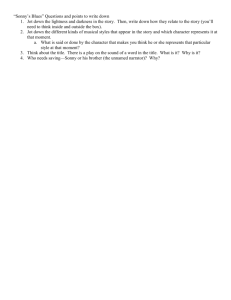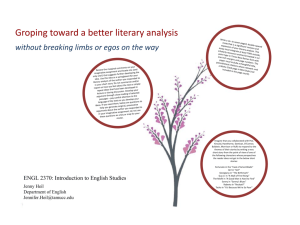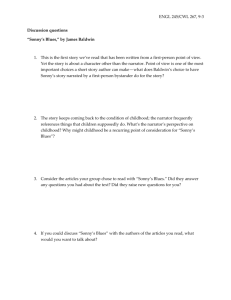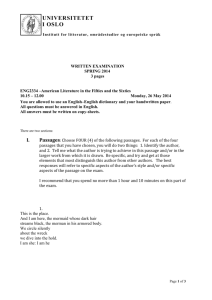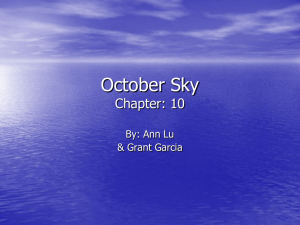Psychological Criticism - Ian Beshaler English Portfolio
advertisement
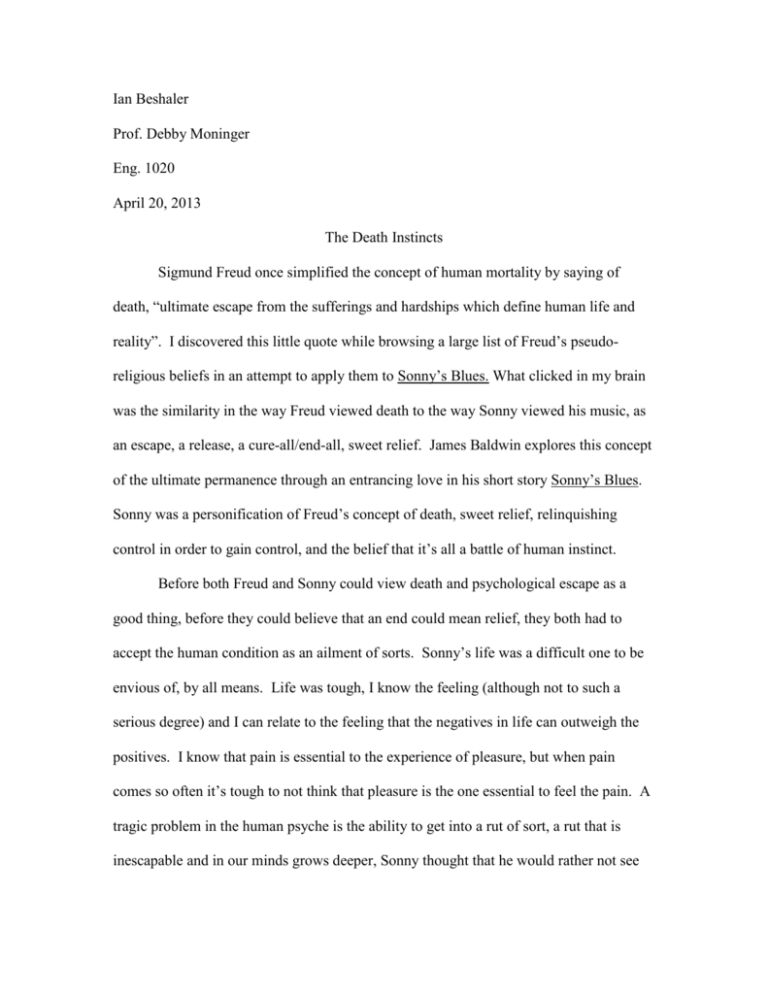
Ian Beshaler Prof. Debby Moninger Eng. 1020 April 20, 2013 The Death Instincts Sigmund Freud once simplified the concept of human mortality by saying of death, “ultimate escape from the sufferings and hardships which define human life and reality”. I discovered this little quote while browsing a large list of Freud’s pseudoreligious beliefs in an attempt to apply them to Sonny’s Blues. What clicked in my brain was the similarity in the way Freud viewed death to the way Sonny viewed his music, as an escape, a release, a cure-all/end-all, sweet relief. James Baldwin explores this concept of the ultimate permanence through an entrancing love in his short story Sonny’s Blues. Sonny was a personification of Freud’s concept of death, sweet relief, relinquishing control in order to gain control, and the belief that it’s all a battle of human instinct. Before both Freud and Sonny could view death and psychological escape as a good thing, before they could believe that an end could mean relief, they both had to accept the human condition as an ailment of sorts. Sonny’s life was a difficult one to be envious of, by all means. Life was tough, I know the feeling (although not to such a serious degree) and I can relate to the feeling that the negatives in life can outweigh the positives. I know that pain is essential to the experience of pleasure, but when pain comes so often it’s tough to not think that pleasure is the one essential to feel the pain. A tragic problem in the human psyche is the ability to get into a rut of sort, a rut that is inescapable and in our minds grows deeper, Sonny thought that he would rather not see how deep the rut got or if it ever grew shallower. Death and music are the only two ways for Sonny to do stop digging the rut, unfortunately only one of the two choices are permanent. In addition to his attempts to escape the feelings of having lost his hope for happiness outweighing sadness, Sonny tried to control his own humanity. Sonny’s Heroine addiction was to him, nothing more than a device he could use to influence his happiness. What started with the attempt to highlight the positives in life ended up destroying many of the remaining good things in Sonny’s life. His attempt to control overwhelming dread (fear of the human condition) Sonny gave sadness and negativity a way to easily control him and in turn, worsened his outlook on mortality. Freud held the belief that human nature was based on instinct, or at least guided by instinct. There are a lot of instincts that come into play in the art of avoiding death, but are there not instincts that come into play pulling us toward death, helping us come to terms with it’s inevitability? I feel something in me that I must believe is instinct, I’m hard pressed to think of something else that could seed these thoughts, that the ultimate goal, the thing we all work for, is to be done with everything. Everything we do, we do to finish, life included; some of these things we enjoy and some we dread, but inevitably we are called to put everything to an end, life included. That being said, there is still an uncertainty associated with death, a fear of the unknown that is the fuel for the instincts within us that lead us to avoid death in most cases. Sonny can be simplified to a prolonged battle between the instinct to die and the instinct to flee the unknown, a battle that no matter what can only end one way, the instinct to die prevailing, and the end that was always coming. Sonny’s addiction was his attempt to control death, to uncover the unknown; his music was his realization of the inevitability of his defeat and his attempt to stave off his own end. In a way, music allowed Sonny to flee his emotional state, unfortunately he had to try less reputable means first (there has to be something juicy happening). Freud’s concept of death is not one that is easy to shape with words, it can at times make complete sense while confusing beliefs you didn’t know you held. I believe that human escapism, our hobbies, our gatherings, everything that occupies our time, it’s all us trying to fight two different instincts fighting over what is really only one option, finality. Sonny was an attempt to personify these warring instincts, he was controlling his fate by handing control to a drug, and he came to terms with his mortality by fighting it. Sonny is a paradox, a paradox that is at the root of all human action, a paradox that will be broken for all of us at the end of our days. Citations "Dictate This." : Harlem Life Expressed in “Sonny’s Blues” : A Review and Analysis. N.p., n.d. Web. 22 Apr. 2013. "Freudian Psychoanalysis as Literary Criticism" 26 March 2003. Web. 21 April. 2013. http://www.academon.com/analytical-essay/freudian-psychoanalysis-as-literarycriticism-25369/ "Freud Quotes." Freud Quotes. N.p., n.d. Web. 22 Apr. 2013. Moore, Joseph. "Freudian Analysis of Sonny in Baldwin’s “Sonny’s Blues”." Joseph Moores Writing Portfolio. N.p., 27 Nov. 2011. Web. 20 Apr. 2013. "Sigmund Freud." About.com 20th Century History. N.p., n.d. Web. 22 Apr. 2013. "Sigmund Freud Biography(1856-1939)." About.com Psychology. N.p., n.d. Web. 22 Apr. 2013. "Sigmund Freud Quotes." About.com Psychology. N.p., n.d. Web. 22 Apr. 2013.
